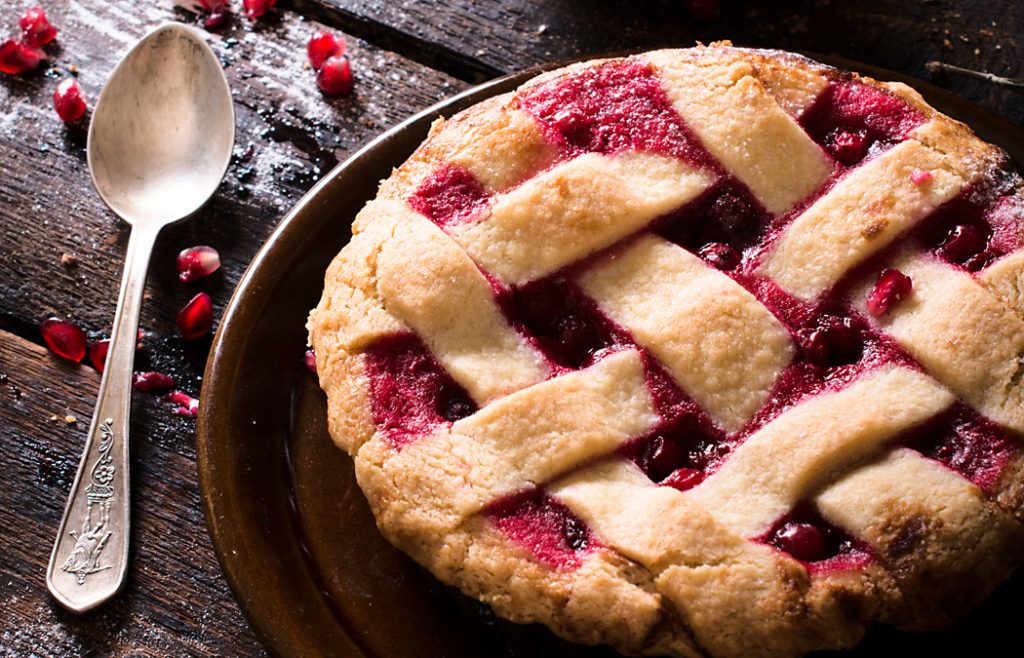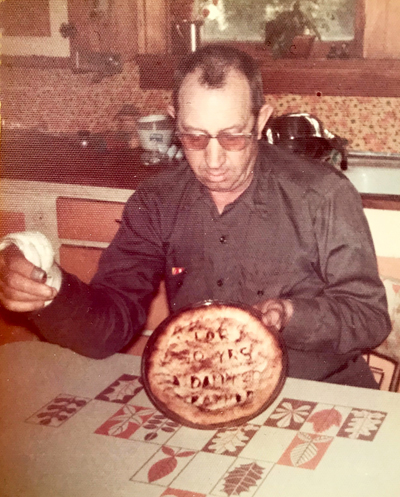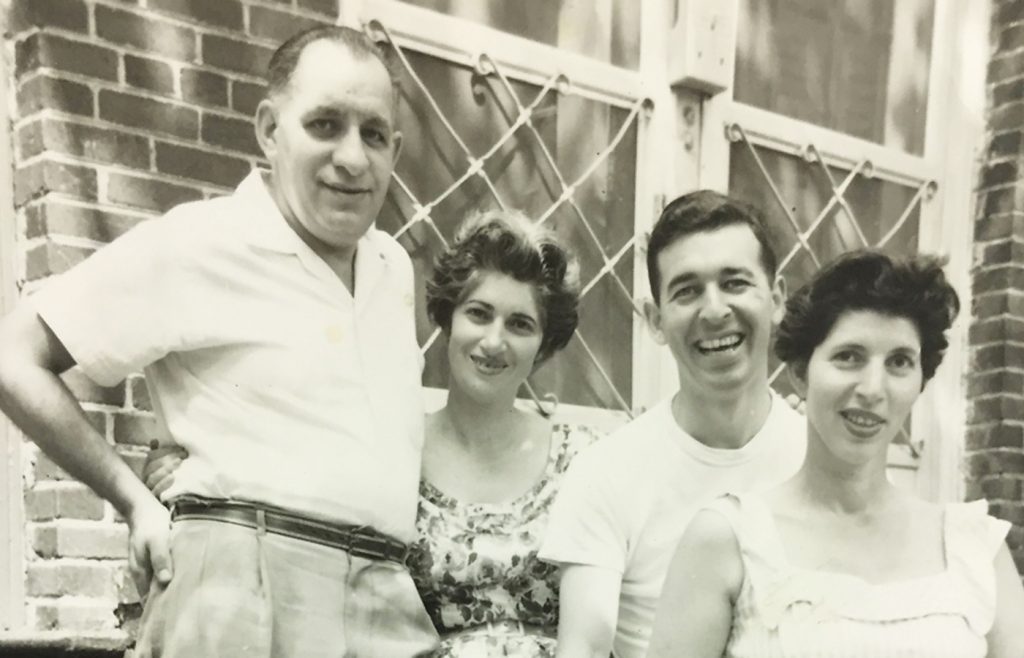
Pie! Pie! by Meredith Siemsen
When you’re just not into football, there is no better place to spend Thanksgiving than on your grandparents’ farm.
To pass the time on the long car ride over from Ames to Newton, the six of us—buckled in, hip to hip—would look for pheasants in the grassy ditch, deer hiding in plain sight, or even dustings of snow in the bare and brittle cornfields. “Over the river and through the woods, to grandmother’s house” we’d go, chirping the tune in harmony with our pink-cheeked mother—who had boldly replaced the lyric about pudding with “turkey.” We didn’t do pudding. But oh my, “Hurrah for the pumpkin pie!”
We knew we were getting close when paved roads turned into gravel hills that rode like rollercoasters in our maroon Plymouth Chrysler sedan. When we finally spotted the red tile roof of the farmhouse in the distance, our hearts would leap out of our chests, and the poor fourth kid who’d been forced to sit up front in the middle seat for that long hour would breathe a sigh of sweet relief. Soon he would be freed from parental scrutiny and the constant terror of interfering with the driver’s feet and elbows. Soon it would be okay. Pie was on the way.
The three or four assorted pies arriving from multiple households promised a harvest-time medley of tart, sweet, and spicy flavors cradled inside blissfully buttery crusts. They were perfect, no-frill recipes for full-bellied afternoon naps on grandpa’s hypoallergenic black leather sofa. Or brisk walks down the lane to the far end of grandpa’s acreage.
But the greatest honor for a seven-year-old like myself wasn’t the eating of the pies. It was the coveted job that presented itself, and became essential really, upon the clearing of Grandma’s special Franciscan-ware dinner plates, the matching gravy boat, and the remains of six gelatinous casseroles. Some important and very responsible person was needed, at this juncture, to be the taker of pie orders.
I loved playing waitress.
After asking Grandma Helen politely, and refastening my symmetrically placed barrettes, I’d be furnished with a tiny notepad—normally reserved for scorekeeping games of Hearts or Scrabble. Around the very long dinner table I’d glide, my newly sharpened pencil on the ready.
Dessert orders from siblings, uncles, and occasional special guests were always some version of “One slice of apple and one slice of pumpkin with Cool Whip all over,” or “Three skinny slices of pecan, apple, and pumpkin, with whip cream on the pumpkin and ice cream on the side.”
Grandpa, however, didn’t mess around. No ice cream, no whipped topping, no pumpkin out of a can.

“Grandpa, may I take your order?” I’d ask, standing by his side at the head of the table, pencil hovering, trying not to stare at his missing thumb. Tractor accident. It had healed over very nicely. His eyes sparkled.
“Cherry!” he’d pronounce without hesitation, startling me back to the task at hand. “Cherry!” I’d write, with an exclamation point.
Cherry. The word would come straight from his gut, resound in his nose, and end with a slight whistle out of his nostril. Then, with a gentle peal of snort-producing laughter, the gladdest sound I knew, he’d send me off to the kitchen again.
Mother reminded me recently that in Grandpa’s later years, he got into the habit of asking for “a piece of each,” so as not to hurt any of the bakers’ feelings. We can’t help but get choked up about it.
But we know: Grandpa Rich was a cherry pie man.
***

Thanks-For-Nothing-Giving by Chloe Hennesy
I thought I’d scored the perfect date cooking Thanksgiving dinner for my crush! It was the early ’90s in the suburbs of Seattle. I was a young barista working a coffee cart inside a large car dealership. He was a sales coordinator who helped arrange all the details after a custom car purchase.
Every morning I would pull out the cart, shuttered at night inside the parts department, and park it between the lounge entryway and the bathrooms for my customers—the new and used car salespeople, the repo man, my secretary friends who got me the job, the parts department folks, the shop guys, and of course, the sales coordinators.
Don was my crush. We had flirted over nutty lattes and cool bands we’d like to see until I’d discovered we’d both be alone on Thanksgiving. I did no less than insist I could cook a homemade meal for us complete with gravy, stuffing, and apple pie. All from scratch and perfect.
He seemed skeptical, but willing, and I was positively titillated when we decided to make it a sleepover date, you know, so we could get up early and make the turkey for dinner—which seemed totally reasonable in my crushing brain.
And I know, this was all very bad judgment, even for the ’90s, but let me assure you, I paid a notable price for my mistakes.
Because I never ended up cooking that meal. We both got the flu that night instead. That’s right. The fevery, aching, sweating, shaking, can’t get up, can’t see, can’t do anything, awful and utterly debilitating flu. AND we got snowed in. AND we had so little OTC medication that we fought over it.
Oh yes, we FOUGHT … and not only over cough medicine, but over why not gin rummy, or what kind of show Wheel of Fortune was anyway, and who’d make the ramen, and why he felt more women needed artificial enhancements.
Yes, this was our Thanksgiving fare.
And I wish I could say I left before learning how deep his love of plastic surgery went, but I cannot. I was young, I made mistakes, and there I was—stuck—knowing all too much about this human’s plastic parts.
Later, back at work, we were cordial, nodding at one another in passing, but I had a hard time looking him in the eye, nose, or hair anytime after that Thanksgiving.
***

The Figurine by Warren Goldie
“Eat,” Aunt Piri commands, piling more turkey on my plate. But I’m hoping for a different kind of nourishment—more of the awesome, hair-raising stories she sometimes shares at holiday meals about when she, my mom Fritzi, and Aunt Susy had been prisoners of war. That’s the kind of fare a seven-year-old hungers for.
Once she told us about the Nazi munitions factory where they worked as slave laborers making bullets and how they purposely made duds, filling the storage barrels to three-quarters full, then topping them off with working bullets. They smiled in their minds, imagining the stunned looks on the faces of the Nazi soldiers pulling useless triggers.
In the Auschwitz concentration camp, she said, in winter, despite the brutal conditions, none of them ever caught a cold. One time, she told us, my mother almost got shot for secreting away a potato in her pants.
“America,” Piri says with reverence as she sets heaping plates of brisket and mashed potatoes on the Thanksgiving table. “We are blessed.”
The street noises of Borough Park drift in. The Brooklyn neighborhood is decades away from what it will become: hip and exclusive, with average home prices of $1 million. Right now, it’s mostly a refuge, a neo-shtetl of traumatized, grateful immigrants trying to piece together new lives.
The two continents represented at the table are worlds apart. My mother and aunt and their husbands—the Europeans (except for my dad)—and the kids, the Americans. We don’t understand them; nor they, us. Puppa, Uncle Alex’s religious father, sits long-bearded and sphinxlike at the head of the table like an emissary from an alien world.
After the meal, at cleanup, in the crowded kitchen, my aunt’s eyes have taken on the faraway look. We kids move in close. She’s there again. As she scrubs, she tells us about the vicious prison guard in their barracks at Auschwitz who, after the war, was tried, convicted, and hanged. My aunts and mom heard the news at a refugee camp in Paris. Their French friends presented them with a celebration layer cake, topped by a plastic figurine of a woman hanging in a noose. Oh, how that made them happy.
Piri is safely back in Brooklyn now, smiling at me, the future hope. “Nu?” she says in Yiddish, meaning “So?” I shrug. She says, “Did you have enough? How about some bobka?”
***
